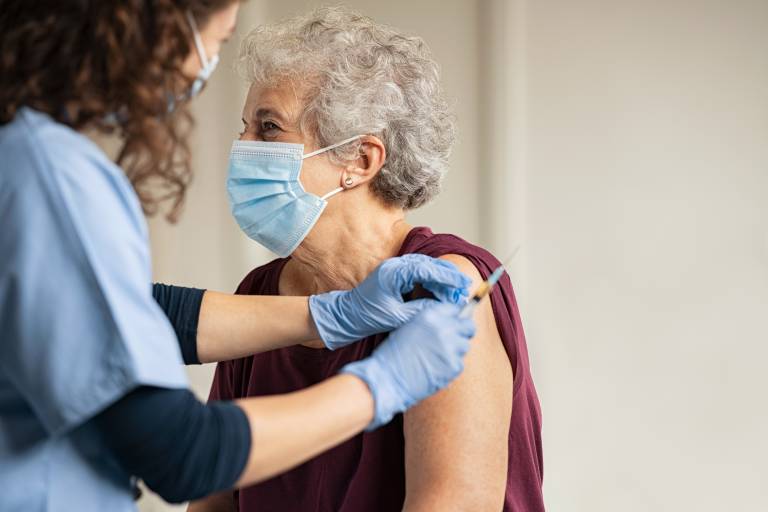Antibody levels vary according to vaccine type and previous infection with COVID-19
30 June 2021
Two doses of the Oxford-AstraZeneca COVID-19 vaccine induce lower levels of antibodies that are able to recognise and fight the SARS-CoV-2 Delta variant (B.1.617.2) than against other strains.

These laboratory findings from the BRC and the Francis Crick Institute are published as a Research letter in The Lancet.
Compared with results from the team’s recent investigation of Pfizer-BioNTech COVID-19 vaccine recipients, these data suggest that both vaccines induce lower levels of antibodies targeting the Delta variant. This trend was most marked for the Oxford-AstraZeneca COVID-19 vaccine. The researchers found two doses of vaccine generate antibody levels that are 2.5x lower against the Delta variant than the Pfizer-BioNTech vaccine.
Levels of antibodies alone do not predict vaccine effectiveness, but this study confirms that two doses of either vaccine are essential to boost antibodies to quantifiable levels that are likely to maximise the amount of protection against severe disease and hospitalisation.
The results also show that antibody levels induced by the Oxford-AstraZeneca vaccine vary considerably depending on likely prior infection with SARS-CoV-2. They observed that people who had previously reported having symptoms of COVID-19, had higher antibody levels after their first vaccine dose.
The tests provide valuable insight into which groups of people are most at risk, even after both vaccine doses, and might require a booster vaccination. Researchers have submitted their findings to the Genotype-to-Phenotype National Virology Consortium (G2P-UK), the New and Emerging Respiratory Virus Threats Advisory Group (NERVTAG) and the Joint Committee on Vaccination and Immunisation (JCVI).
The team found that in people who had been fully vaccinated with two doses of the Oxford-AstraZeneca vaccine, nearly all participants had a quantifiable level of neutralising antibodies against the variants previously dominant in the UK. But significantly fewer people had quantifiable levels against the Beta and Delta variants (60% and 62% respectively). This contrasted with the Pfizer-BioNTech analysis, which showed that over 95% of recipients had quantifiable neutralising antibody levels against the Beta and Delta variants after both doses.
In people who had only received one dose of the Oxford-AstraZeneca vaccine, levels varied according to previous infection. Those with prior COVID-19 symptoms had significantly higher levels of neutralising antibodies against all strains, than those who hadn’t been infected. And a significant proportion of people without prior COVID-19 symptoms had antibody levels below the limit of detection against new variants of concern. This variation was not seen in recipients of the Pfizer-BioNTech vaccine.
The people analysed in this part of the study were younger than average Oxford-AstraZeneca vaccine recipients (median age 34), so more research is needed to understand the antibody response in older people.
Dr Emma Wall, UCLH Infectious Diseases consultant and Senior Clinical Research Fellow for the Legacy study, said: “This is more evidence in support of ensuring everyone gets two doses of vaccine to protect against severe COVID-19, including reducing the gap between vaccine doses wherever supply and capacity allows. We can see clearly that the Delta variant poses a significant threat, but that two vaccine doses, and likely an additional booster, will be the best way to maximise protection, particularly against hospitalisations and deaths from COVID-19.”
David LV Bauer, group leader of the Crick’s RNA Virus Replication Laboratory and member of the G2P-UK National Virology Consortium, said: “While many people have had COVID in the past, the new Delta variant is slightly different from the virus that people will have encountered in 2020 or early 2021. Our results underline how important it is for everyone to get vaccinated and to attend appointments for their second jab too.”
 Close
Close

